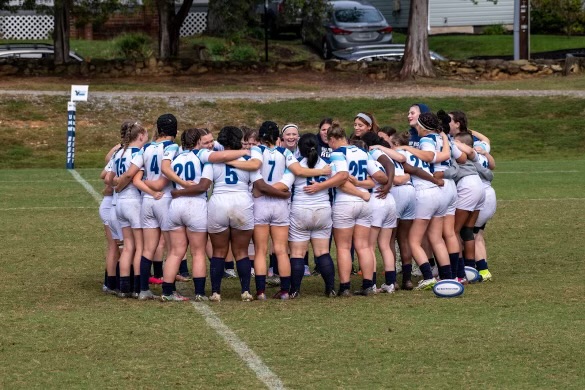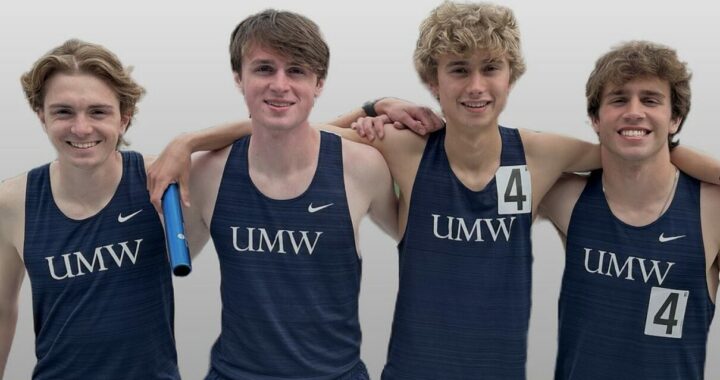Battling the status quo: UMW Women’s Rugby tackles rookies and misogyny on the pitch
3 min read
The women’s rugby team congregate together during a match. | Photo courtesy of Irene Castellet
by IRENE CASTELLET
Staff Writer
From coaching rookies to getting tackled on the pitch and the stigma associated with women playing a contact sport, nothing can deter the UMW Women’s Rugby team as they hit the pitch.
On Feb. 24, the UMW Women’s Rugby team played back-to-back games against George Washington University and the University of Maryland. In the first game of their spring season, UMW defeated George Washington 31–0 and then beat Maryland 25–17.
The games were part of a friendly “sevens tournament” in which there are seven players on either side rather than the usual 15—though the game is played on the same size pitch.
Every year, the team welcomes several rookies who are gradually introduced to the sport with the help of their coaches and teammates. During the fall 2023 semester, there were 13 rookies, and four more joined for the spring season.
In 2015, UMW Women’s Rugby changed from a club sport to an NCAA Division II team sport. Nevertheless, the team is open to everybody, regardless of one’s experience. Furthermore, as many of the rookies have no prior experience with a contact sport, they have to practice the skills that they will then need on the pitch.
“They come in a clean state, eager to learn,” said Director of Rugby Gearoid Dunbar about the rookies on the team.
Sophomore history and art double major Amelia Bailey is one of the team’s fall semester rookies, which means that her training also involves a lot of learning.
“They teach us how to tackle and how to take tackles. They make sure it’s safe for us, so I wasn’t worried about getting hurt,” she said. “We had a few other rookies in the fall, so I wasn’t alone in learning, which was really nice.”
Deanna Fortney, a junior anthropology and historic preservation double major, is in her third semester on the team and finds tackling to be an enjoyable part of the sport.
“When you run into each other it’s like a really fun bonding experience,” she said.
Skyler Revutin, a senior psychology and Spanish double major joined the team as a rookie in the fall semester of her junior year and stayed for the community the team fosters.
“There’s definitely a learning curve, especially having never played the sport, but I liked it,” said Revutin. “I love the team; that’s what brought me back.”
According to Dunbar, unlike other sports, rugby does not have different rules for women’s and men’s teams; it is the same sport for everyone.
The stigma surrounding women participating in contact sports persisted for a long time, highlighted by the fact that it wasn’t until 1962 when the inaugural women’s rugby union team was established at Edinburgh University. Even though more than 50 years have passed since then, some continue to think that rugby is not appropriate for women to play.
But the players on UMW Women’s Rugby don’t let those comments discourage them.
“People always have comments about it, like, ‘that’s a lot of contact,’ but honestly I find it fun,” said Bailey.
Joe Bevan, a sophomore business administration major who plays for the UMW Men’s Rugby team—often referred to as “Mother’s Rugby”—spoke against this stigma.
“I think the stigma of girls not playing rugby because it’s too rough for them is absolute nonsense. It’s a great all-around sport that everyone should play,” said Bevan. “It builds character while making you fall in love with a new sport and meet new people.”
The community and friendship built into the women’s team are some of the team’s attractions, and the connections players make may also extend beyond their college careers.
“[The players] get through this together and realize that working as a team they can achieve success,” said Kris Kabza, the head coach of the women’s rugby team. “You wind up making friends at various colleges and then, once you graduate, you find that the woman you were beaten up for the last four years is now on your team; that bond goes beyond college.”
“I think that if I hadn’t joined rugby, I wouldn’t have met most of my friends now,” said Revutin. “Everybody is there to support each other. We are all friends. We all love each other. It’s a family. Our team is a family.”










